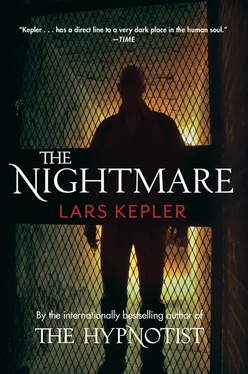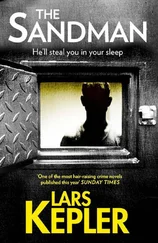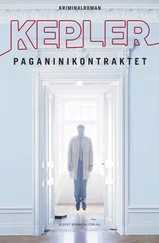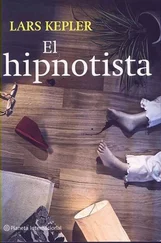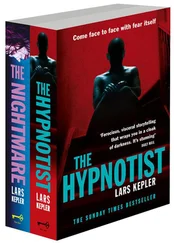Lars Kepler - The Nightmare
Здесь есть возможность читать онлайн «Lars Kepler - The Nightmare» — ознакомительный отрывок электронной книги совершенно бесплатно, а после прочтения отрывка купить полную версию. В некоторых случаях можно слушать аудио, скачать через торрент в формате fb2 и присутствует краткое содержание. Жанр: Триллер, на английском языке. Описание произведения, (предисловие) а так же отзывы посетителей доступны на портале библиотеки ЛибКат.
- Название:The Nightmare
- Автор:
- Жанр:
- Год:неизвестен
- ISBN:нет данных
- Рейтинг книги:5 / 5. Голосов: 1
-
Избранное:Добавить в избранное
- Отзывы:
-
Ваша оценка:
- 100
- 1
- 2
- 3
- 4
- 5
The Nightmare: краткое содержание, описание и аннотация
Предлагаем к чтению аннотацию, описание, краткое содержание или предисловие (зависит от того, что написал сам автор книги «The Nightmare»). Если вы не нашли необходимую информацию о книге — напишите в комментариях, мы постараемся отыскать её.
The Nightmare — читать онлайн ознакомительный отрывок
Ниже представлен текст книги, разбитый по страницам. Система сохранения места последней прочитанной страницы, позволяет с удобством читать онлайн бесплатно книгу «The Nightmare», без необходимости каждый раз заново искать на чём Вы остановились. Поставьте закладку, и сможете в любой момент перейти на страницу, на которой закончили чтение.
Интервал:
Закладка:
There are days when Penelope thinks she remembers her first years. The smell of steaming unwashed bodies. The cell where she was born. The wash of a flashlight beam across the faces of the prisoners. How she felt as her mother lifted her up over others to someone else before her mother disappeared with the guards. How a tune is hummed into her ear.
66
Claudia Fernandez gets off the bus at Dalaro Beach Hotel. As she walks to the harbor, she can hear the sounds of helicopters and sirens fading into the distance. The search can’t be over. They have to keep looking. A few police boats are moving out on the water. She looks around. There’s no ferry at the dock and no cars waiting at the harbor.
“Penelope!” she screams right into the air. “Penelope!”
She realizes she must look insane, but without Penelope, there’s nothing left on this earth for her.
She begins to walk along the water. The grass is dry and brown, with pieces of garbage everywhere. Seagulls screech in the distance. She begins to run, but soon can’t keep it up and she starts to walk again. Empty cottages stand on the edge of a cliff. She stops next to a sign by a dock where the word PRIVATE is written in white letters. She turns onto the cement dock and looks toward the large cliffs. There’s no one here, she thinks. She turns back toward the harbor. A man is walking along the gravel road and he waves to her. It’s a dark figure with his coat flapping in the breeze. She blinks in the sunlight. The man shouts something. Claudia looks at him in confusion. He begins to walk more quickly, nears her, and only then does she recognize his friendly face.
“Claudia Fernandez!” he calls out.
“That’s me,” she replies, and waits for him to catch up to her.
“I’m John Bengtsson,” he says as he reaches her. “Joona Linna sent me to find you. He told me that you’d probably come here.”
“Why do you need me?” she says in a weak voice.
“Your daughter is alive.”
Claudia looks into the man’s face. He repeats those words.
“Penelope is alive,” he’s saying, and he gives her a big smile.
67
Emotions are running high at the police station until the pitch is almost hate-filled. People compare the recent events to the police murders in Malexander in 1999 and the bestiality of the triple murders in Tumba two years before. The newspapers shout about the drama in the archipelago seas. They name the suspect “The Police Butcher,” and journalists pounce on any lead, any possible source inside the station.
Joona Linna and Saga Bauer are going to brief a meeting of the department heads, Eliasson, Zanden, Naslund, and Rubin, as well as Nathan Pollock and Tommy Kofoed from the National Homicide Squad. They’re on their way through the hallway and discussing what help Penelope Fernandez might be able to give.
“I think she’ll be able to talk soon,” Joona says.
“I’m not so sure. She could go the other way and just shut down completely,” Saga says.
Anja Larsson has taken a step out of her office and stands in the hallway watching Joona and Saga mournfully. When Joona sees her, he gives her a big smile and waves, but he’s gone past too quickly to see the heart she’s formed with her thumbs and index fingers.
They shut the conference-room door behind them and greet everyone around the table.
“I want to start today by dismissing all suspicions of left-wing extremists being behind this,” Saga begins.
Verner Zanden whispers something to Nathan Pollock.
“Am I right?” Saga says, raising her voice.
Verner looks up and nods.
“That’s right,” he says, clearing his throat.
“Why don’t you start at the beginning?” Carlos asks Saga.
“Well… we are focused on an individual, Penelope Fernandez, who is a peace activist and the chairwoman for the Swedish Peace and Reconciliation Society. She has been in a long personal relationship with Bjorn Almskog, a bartender at the Debaser club on Medborgarplatsen. She lives at Sankt Paulsgatan 3 and he lives at Pontonjargatan 47. Penelope Fernandez had a photograph taped to the glass door between her living room and the hallway.”
Saga projects an image from her computer onto the screen that covers one wall of the room.
“This photograph was taken in Frankfurt in the spring of 2008,” she says.
“We recognize Palmcrona,” Carlos says.
“That’s right,” Saga says, and then points out the other people in the theater box. “This is Pontus Salman, the director of the weapons manufacturer Silencia Defense. This person is none other than Raphael Guidi. He’s a well-known weapons dealer for many years, mainly in Africa and the Middle East. They call him the Archangel.”
“And the lady in the group?” asks Benny Rubin.
“That’s Agathe al-Haji,” Saga says without smiling. “She’s the military adviser to the government in Sudan and has close ties with President Omar al-Bashir.”
Benny slaps the table and shows his teeth. Pollock gives him an irritated look.
“Is this usual?” asks Carlos. “Do people meet like this?”
“Yes, I believe so,” Saga replies. “This meeting was supposedly about a shipment of ammunition going to the Sudanese army. It would have been completed, without a doubt, if the International Criminal Court in The Hague hadn’t issued an arrest warrant for President al-Bashir.”
“That was in 2009, wasn’t it?” asks Pollock.
“It wasn’t written up in the Swedish press,” Saga says. “But the indictment pointed a finger at the president’s direct participation in torture, rape, and genocide in Darfur.”
“So the deal was scotched,” Carlos says.
“Yes,” says Saga.
“And what about that photograph? What’s going on there? Nothing?” Verner asks.
“Penelope Fernandez must not have thought it was dangerous since she displayed it openly on her door,” Saga says.
“And yet it must be important-since she had it there at all,” Carlos says.
“We have no idea why. Perhaps it served as a reminder of how the world works,” Saga speculates. “A few poor people fight for peace at the bottom of the barrel, while at the top the mighty clink their glasses and drink champagne over an arms deal.”
“We hope to question Penelope Fernandez soon, but we’re fairly sure Bjorn Almskog tried to deal behind her back,” Joona continues. “Perhaps he knew nothing more about the photo than Penelope, or maybe he was just grasping at a chance to make money. But on the second of June, Bjorn uses an anonymous e-mail address in an Internet cafe to write a blackmail letter to Carl Palmcrona. The e-mail begins a very short correspondence: Bjorn writes he knows the photograph can be troublesome for Palmcrona and he’s ready to sell it to him for a million crowns.”
“Classic blackmail,” Pollock mutters.
“Bjorn uses the word ‘awkward’ concerning this photograph,” Saga continues. “This makes us believe that he does not understand how serious Palmcrona will find it to be.”
“Bjorn believes he’s in control,” Joona says. “So he’s amazed when Palmcrona turns around and warns him. Palmcrona explains darkly that Bjorn does not know what he’s gotten himself into and then pleads with him to mail him the photograph before it’s too late.”
Joona drinks some water.
“What is the tone of the letter?” Nathan Pollock asks. “You say it’s ‘dark,’ but is it also aggressive?”
Joona shakes his head as he passes out copies of the correspondence.
“No. Not aggressive. Rather, tinged with fear-for himself.”
Tommy Kofoed reads the e-mails, nods, rubs his pockmarked cheeks, and writes something down.
Читать дальшеИнтервал:
Закладка:
Похожие книги на «The Nightmare»
Представляем Вашему вниманию похожие книги на «The Nightmare» списком для выбора. Мы отобрали схожую по названию и смыслу литературу в надежде предоставить читателям больше вариантов отыскать новые, интересные, ещё непрочитанные произведения.
Обсуждение, отзывы о книге «The Nightmare» и просто собственные мнения читателей. Оставьте ваши комментарии, напишите, что Вы думаете о произведении, его смысле или главных героях. Укажите что конкретно понравилось, а что нет, и почему Вы так считаете.
